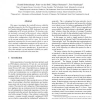Free Online Productivity Tools
i2Speak
i2Symbol
i2OCR
iTex2Img
iWeb2Print
iWeb2Shot
i2Type
iPdf2Split
iPdf2Merge
i2Bopomofo
i2Arabic
i2Style
i2Image
i2PDF
iLatex2Rtf
Sci2ools
DSN
2003
IEEE
2003
IEEE
Cost-Optimization of the IPv4 Zeroconf Protocol
This paper investigates the tradeoff between reliability and effectiveness for the IPv4 Zeroconf protocol, proposed by Cheshire/Adoba/Guttman in 2002, dedicated to the selfconfiguration of IP network interfaces. We develop a simple stochastic cost model of the protocol, where reliability is measured in terms of the probability to avoid an address collision after configuration, while effectiveness is viewed as the average penalty perceived by a user. We derive an analytical expression for the user penalty which we use to derive optimal configuration parameters of the network, restricting to those parameters which are under the control of a consumer electronics manufacturer. In particular we show that minimal cost and maximal reliability are qualities that cannot be achieved at the same time.
Computer Networks | DSN 2003 | IP Network Interfaces | Optimal Configuration Parameters | Simple Stochastic Cost |
| Added | 04 Jul 2010 |
| Updated | 04 Jul 2010 |
| Type | Conference |
| Year | 2003 |
| Where | DSN |
| Authors | Henrik C. Bohnenkamp, Peter van der Stok, Holger Hermanns, Frits W. Vaandrager |
Comments (0)

